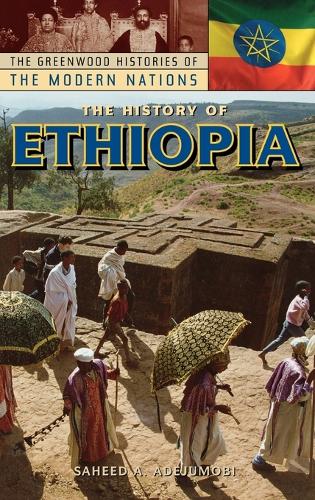
The History of Ethiopia
(Hardback)
Publishing Details
The History of Ethiopia
By (Author) Saheed A. Adejumobi
Bloomsbury Publishing PLC
Greenwood Press
30th December 2006
United States
Classifications
General
Non Fiction
963
Physical Properties
Hardback
248
Width 156mm, Height 235mm
510g
Description
This engaging and informative historical narrative provides an excellent introduction to the history of Ethiopia from the classical era through the modern age. The acute historical analysis contained in this volume allows readers to critically interrogate shifting global power configurations from the late nineteenth century to the twentieth century, and the related implications in Ethiopia and the Horn of Africa region. Adejumobi identifies a second wave of globalization, beginning in the nineteenth century, which laid the foundation for a highly textured Ethiopian Afromodern twentieth century. The book explores Ethiopia's efforts at charting an independent course in the face of imperialism, World War II, the Cold War and international economic reforms with a focus on the gap between the state's modernization reforms and the citizenry's aspirations of modernity. The book focuses on Ethiopians' efforts to balance challenges related to social, political and economic reforms with a renaissance in the arts, theater, Orthodox Coptic Christianity, Islam and ancient ethnic identities. The History of Ethiopia paints a vivid picture of a dynamic and compelling country and region for students, scholars, and general readers seeking to grasp twenty-first century global relations. The work also provides a timeline of events in Ethiopian history, brief biographies of key figures, and a bibliographic essay.
Reviews
Adejumobi describes the history of Ethiopia for students and lay readers, devoting a large section to contemporary issues. The book includes an introductory overview of the country's geography, political institutions, economic structure, and culture. It explores shifting global and local power configurations from the late nineteenth century to the twentieth and related implications in Ethiopia and the Horn of Africa region, in addition to how the country sustained resources while involved with international, regional, and local politics. The country's independence, and social, political, and economic reforms are also discussed. Biographical sketches of important individuals are included. * Reference & Research Book News *
Author Bio
Saheed A. Adejumobi is Assistant Professor of History with the Global African Studies Program and Department of History at Seattle University. He has written widely on African and African Diaspora intellectual and cultural history and traditions.
